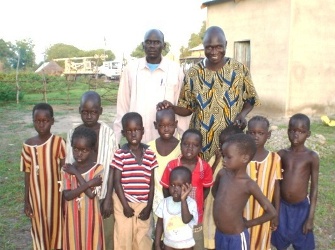Ethiopia: UNHCR launches relocation of South Sudanese refugees
By Tesfa-Alem Tekle
May 11, 2015 (ADDIS ABABA) – The United Nations High Commissioner for Refugees (UNHCR) has begun relocating thousands of South Sudanese refugees from flood-prone areas in Ethiopia’s Gambella region to a newly constructed refugee camp.

In a statement issued on Monday and extended to Sudan Tribune, over 4,000 refugees have been relocated from the flood-affected Liet-chuor and Nip-Nip camps near the border with South Sudan to the newly established Jewi camp, only 18 kilometres away from the Gambella regional capital, Gambella town, in western Ethiopia.
The refugees were transferred to the new camp during the last three days with an additional convoy of buses carrying some 1,680 people on their way to Jewi camp.
“The relocation exercise to Jewi reefugee camp was launched on Friday, 8 May with the first convoy of 1,376 refugees arriving in the new camp,” said the statement from the UNHCR-Ethiopia.
“Over the weekend, more than 4,200 refugees had been relocated from flood-prone Liet-chuor and Nip-Nip camps,” it says.
The UNHCR head of sub-office, Angele Djohossou, and the ARRA zonal coordinator, Teferi Bekele, welcomed the first batch of refugees to Jewi camp and assured them of protection and better humanitarian services.
Djohossou commended all partners for ensuring that protection and essential services such as shelter, medical care, water and sanitation were in place for the relocating refugees.
“We are sincerely thankful to the government of Ethiopia and to all donors for making the launch of relocation to Jewi camp a reality,” she said.
UNHCR said relocating refugees from flood-prone areas had been fraught with challenges key of which was identifying a suitable site.
Jewi camp has a capacity of about 50,000 refugees. It will accommodate about 48,000 refugees from the low land Liet-chuor camp, which was established in January 2014, but became flooded last August together with Nip Nip camp.
The International Organization for Migration (IOM) is facilitating convoy movement which will now focus on relocating refugees to better suitable locations within Gambella region.
WFP is also providing the refugees high energy biscuits and water during the journey and other basic assistance up on arrival.
There are over 200,000 South Sudanese refugees in various camps in Ethiopia, who are predominantly from the Nuer ethnic group.
CIVILIANS LEFT WITHOUT AID
Meanwhile, the United Nations said on Monday over 300,000 South Sudanese civilians are without “life-saving aid” after fierce fighting in the country’s oil-rich Unity state forced all international aid organizations to suspend their relief operations.
“Ongoing hostilities in Unity state have now obliged all non-governmental organisations and UN agencies to evacuate staff from Leer and other locations,” UN aid chief in South Sudan, Toby Lanzer, said in a statement.
“As a consequence, over 300,000 civilians who are in need of emergency relief, including food aid and medical services, do not currently have access to such life-saving assistance,” he said.
On Monday, the UN revealed that all its agencies as well as other non-governmental organizations have evacuated their staff from Leer and some other areas of the state.
According to the UN over 100,000 people had been uprooted in the first week of May alone, following heavy fighting between the two warring factions.
Among aid groups which pulled out of the war zone include the International Committee of the Red Cross and Doctors Without Borders.
Lanzer called on the two rival factions to immediately allow aid groups to resume their humanitarian operation.
He further said the renewed violence in southern part of Unity state came at a time when stocks of food were depleted and precisely at the height of the traditional planting season when civilians could be planting their crops in order to reap a harvest later this year.
The intensity, destruction and subsequent humanitarian consequences of the fighting between president Salva Kiir’s government and rebel group led by his former deputy, Riek Machar, is concentrated in the strategic and richest Upper Nile region where national army and rebel forces have massively deployed to battle for its control.
The peace process led by the East African regional bloc, the Inter-governmental Authority on Development (IGAD) in Addis Ababa, which aimed to end the 17-month long conflict in the youngest nation, only yields little progress.
The last round of peace negotiations collapsed on 6 March after rival leaders failed to agree on almost all outstanding issues.
IGAD has prepared a new draft proposal for the next round of talks along with the African Union, UN, EU, troika countries and China who wanted to participate on the peace process.
Regional mediators haven’t yet officially announced timetable for resumption of next round of talks, which is however expected to resume later this month.
The war has killed tens of thousands and displaced more than 2 million South Sudanese.
(ST)
